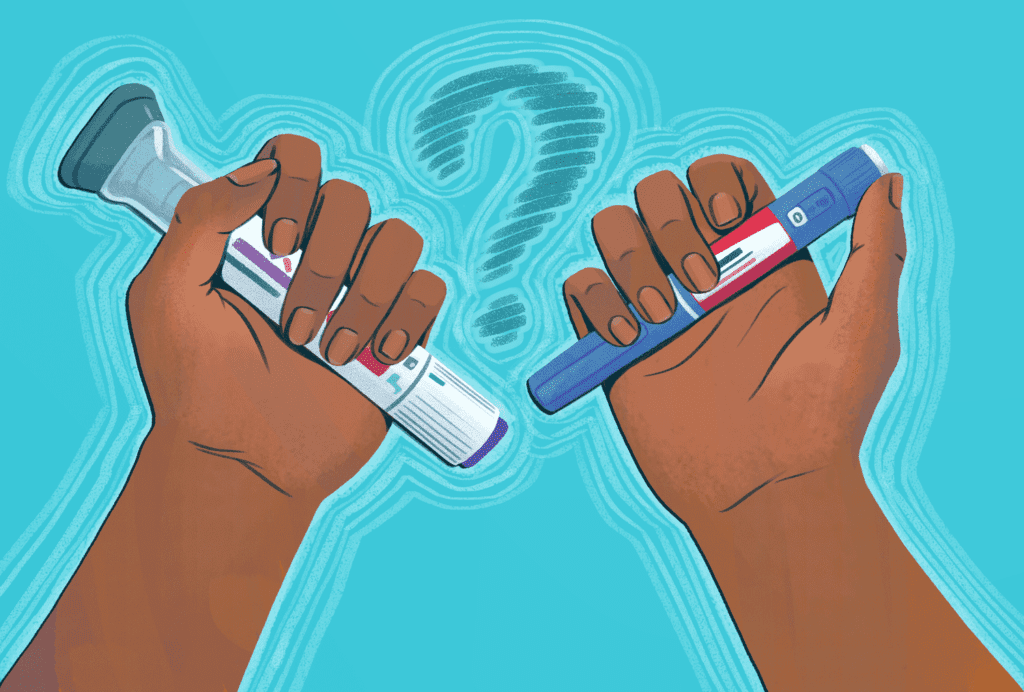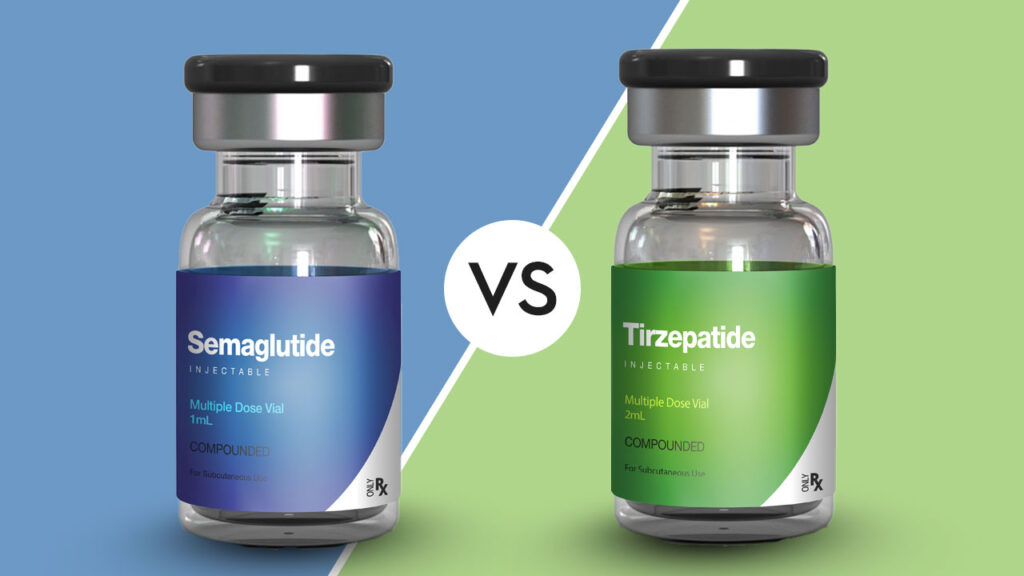The Ultimate Guide to Tirzepatide (Zepbound & Mounjaro): Dual Action Weight Loss with DripToYou
Introduction to Tirzepatide Weight Loss Program Weight loss medications have evolved dramatically over the last decade, but few breakthroughs compare to tirzepatide, the active ingredient in Zepbound and Mounjaro. Unlike older options that often targeted only one pathway, tirzepatide works on two powerful metabolic receptors simultaneously (GLP-1 and GIP).This dual action not only helps regulate appetite but also improves how the body processes sugars and stores fat, making it one of the most effective tools available for sustainable weight management. The reason tirzepatide stands out is its capacity to achieve comparable outcomes to bariatric surgery for some patients yet never needing to perform surgery.Average 20% total body weight loss has been documented by clinical trials, as well as blood sugar, blood pressure, and cholesterol improvement. What this equates to is patients who are losing pounds yet are lowering their chances for critical health issues such as diabetes, heart disease, and sleep apnea.On DripToYou, with medical direction by Dr. Babak Moeinolmolki (Dr. Moein), patients can access tirzepatide through a medically supervised program, individually and safely customized to each patient. Instead of a universal prescription, patients are registered in a customized program based upon their health profile, goals, and lifestyle.With individualized advice, close follow care, and extended support, patients realize beyond transient weight loss: lasting best health, vibrancy, and confidence.What Makes Tirzepatide Different? Dual Action GLP-1 + GIPYou have likely heard of GLP-1 medicines such as Wegovy® or Ozempic®. These medicines imitate an natural hormone (GLP-1) to tell us we’re full, to slow down digestion, and to control blood sugar. They’re very potent for weight loss, but tirzepatide does one better. Tirzepatide is the first medication to target two incretin hormones at once: GLP-1 (Glucagon-Like Peptide-1): Makes one less hungry, reduces stomach emptying, and. GIP (Glucose-Dependent Insulinotropic Polypeptide): Stimulates better utilization of the body’s own insulin, helps in fat burning, and could also enhance feelings of full.By simultaneously activating GLP-1 and GIP receptors, tirzepatide provides a synergistic Stronger appetite suppression – patients feel full sooner and stay satisfied longer. More fat burning – The body becomes better at burning fat stores to supply energy. Improved metabolic health – and added benefits for blood sugar, cholesterol, and overall cardiovascular risk. This dual incretin therapy is why, during trials, patients treated with tirzepatide lose substantially more weight than those treated with a GLP-1–only drug, and it’s indeed a meaningful shift in obesity medicine.Zepbound vs. Mounjaro: Same Medication, Different ApprovalAt the core, Zepbound and Mounjaro are the same drug: tirzepatide. What sets them apart is not the science but the FDA approval pathway and how doctors prescribe them.In 2022, it was initially approved to treat type 2 diabetes. When put in clinical trials, not only did researchers observe patients’ decline in blood glucose, but researchers also observed patients losing dramatic amounts of weight.Later approval (2023) occurred for weight loss and obesity, in obesity (BMI 30 and above) or overweight (BMI 27 and above and at least one condition related to weight).Why there is a confusion?Both medicines are tirzepatide, but it depends on what it’s being taken for. Insurers also find it easier to cover Mounjaro for diabetes than Zepbound for obesity, leading some patients to wonder if they can just order one instead of another. Marketing is also involved here: Zepbound comes on the market as a “weight loss” medication, and Mounjaro as a “diabetes” medication, yet they have an identical mechanism of action.Bottom line: Whether you’re placed on Mounjaro or Zepbound, you’re receiving basically the same medication. What you want to consider most is your health objective, your insurance coverage, and having a provider who can help you to take advantage of alternatives in a safe way.Who Is a Good Candidate for Tirzepatide?Tirzepatide is not perfect for all, but it can be life-changing for those who are best suited. This one can benefit most:BMI Specifications:Commonly recommended for those who have an adult BMI of 30 or above, or 27 and above and at least one condition related to their weight. Weight-Associated Health Issues: Those suffering from type 2 diabetes, high blood pressure, high cholesterol, fat liver disease, or PCOS can experience dramatic changes in both weight and central metabolic syndrome.The Importance of Individualized Care:Since obesity as a disease state is complex and chronic, there are not two identical patients. Dr. Moein assesses every individual’s medical history, lifestyle, and risk profile to determine whether tirzepatide can be an appropriate and safe option for treatment. This customized process ensures not only an adequate therapeutic response to lose weight but also support for long-term health objectives.Side Effects and Safety ConsiderationsLike all medicines issued, tirzepatide comes with both common and not-so-common but important risks. Patient awareness of these helps patients feel better-informed and better-supported during treatment.Common Side Effects:Many patients experience mild to moderate nausea, constipation, diarrhea, or fatigue as treatment adapts to their body. These side effects often prove to be short-lived and can be managed through dose adjustments, fluids, and dietary counseling.Rare but Serious Risks:Although rare, more critical problems such as pancreatitis (pancreas inflammation) or thyroid-related problems (such as thyroid C-cell tumors, seen in laboratory research in animals) have been encountered. Patients who have had problems involving certain types of thyroid cancer or life-threatening disease in the stomach, small intestine, and/or colon can’t take tirzepatide.Why Medical Supervision Matters:At DripToYou by Dr. Babak Moeinolmolki, you’re completely monitored and observed through labs, check-ins, and follow-up support. This not only means treatment works, it’s also safe and tailored to your specific needs as an individual patient.Why Everyone Is Talking About Zepbound & Mounjaro?You can’t scroll through TikTok or Instagram without seeing someone talk about Zepbound or Mounjaro. These medicines have been overnight cultural sensations.Social Media Discussion:On TikTok, #Mounjaro and #Zepbound have been able to garner hundreds of millions of views, as people create “before and after” makeovers, weekly injection vlog posts, and weight loss updates.Influencer and Celebrity References:• Elon Musk attributes his weight loss to “fasting and Wegovy,” sparking mainstream interest in GLP-1 drugs in general. • Hundreds of lifestyle








